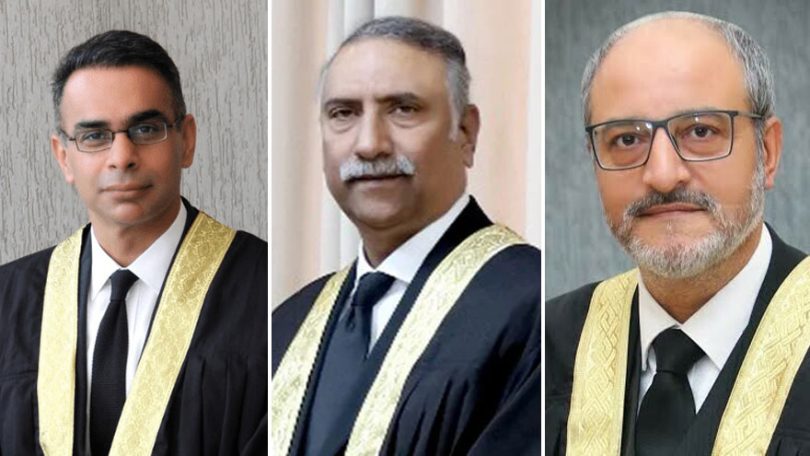F.P. Report
ISLAMABAD : Islamabad High Court (IHC) judges Babar Sattar and Sardar Ejaz Ishaq Khan on Tuesday circulated a letter sharply criticising Chief Justice Mohammad Sarfraz Dogar, accusing him of undermining judicial independence and turning the court’s administration into a “monocracy.”
The letter was shared ahead of a full court meeting convened to mark the start of the new judicial year.
Justice Dogar presided over Tuesday’s session, attended by all sitting judges, and has summoned another full court meeting today (Wednesday) at 2pm. Such gatherings are typically used to review institutional performance and set priorities, but this year’s proceedings have been overshadowed by Justice Sattar’s unusually candid charge sheet.
In his letter, judges welcomed the meeting as “long overdue” but argued that it must confront “the illegalities that have seeped into the administration of Islamabad High Court.”
They accused Justice Dogar of sidelining senior judges, misusing administrative powers, and eroding the court’s role as a guardian of fundamental rights.
Key allegations raised by Justice Sattar
- Diminished constitutional role: Justice Sattar questioned whether the IHC was still seen as a protector of fundamental rights, warning that public confidence in the court had waned.
- Neglect of district judiciary: He criticised the “musical chairs” system in which district courts are led largely by “deputationists”, rather than developing a strong independent institution.
- Opaque case fixation: Sattar alleged that rosters were manipulated to exclude senior judges and disproportionately assign cases to recently transferred or additional judges, undermining transparency.
Read Also: Rules amended without full court meeting are illegal, writes Justice Sattar
- Misuse of administrative authority: He accused Justice Dogar’s office of refusing to issue cause lists in violation of judicial orders, transferring cases without legal authority, and stripping certain judges of their dockets.
- Exclusionary committees: According to Sattar, key administrative committees were deliberately structured to exclude the two most senior judges of the IHC, breaching established norms.
- Excessive control over judges: He criticised a circular requiring judges to seek a no-objection certificate (NOC) from the chief justice before travelling abroad, likening it to placing judges on the Exit Control List.
- Skewed performance reporting: Justice Sattar argued that judicial statistics were being manipulated to suggest that some judges were far more efficient than others, urging the adoption of a consensual framework for performance evaluation.
“Institutions can be destroyed overnight”
Justice Sattar warned that decades of institution-building could be undone within years if current practices continued. Quoting Rousseau and Lord Acton, “power tends to corrupt and absolute power corrupts absolutely”, he argued that concentration of power in the chief justice’s office risked destroying the judiciary’s credibility.
He stressed that his critique was not intended as an attack on Justice Dogar personally but as a candid call for reform: “Without honest identification and admission of our failings, there can be no corrective action.”
Context of ongoing tensions
This is not the first time Justice Sattar has challenged the IHC administration. He previously raised objections over amendments to IHC Rules and the constitution of committees.
Recently, Justice Dogar set up a special bench, including Justice Sattar and Justice Sardar Ejaz, to clear nearly 2,000 pending tax references. However, all other cases from their dockets were redistributed among other judges, further intensifying tensions.
The coming full court meeting is expected to be dominated by Justice Sattar’s allegations, with other judges also expressing concerns over the state of affairs at the high court.







